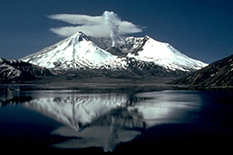National Academies Committee Led by CEE Professor Outlines Framework to Protect Residents from Mount St. Helens Legacy
Critical infrastructure repairs and long-term strategies are needed to reduce the risks of flooding left behind by the eruption of Mount St. Helens. This is the conclusion of a recent report released by a National Academies of Sciences, Engineering, and Medicine (NASEM) committee chaired by Department of Civil and Environmental Engineering Professor Gregory Baecher. The volcano's 1980 eruption left nearby Spirit Lake dammed with a precarious mass of ash, earth, rock, and other debris that is now the only thing protecting 50,000 Washington residents from catastrophic flooding and mudflows. But the drainage tunnel installed in 1985 to keep rising lake levels from flowing over the makeshift dam—potentially destroying it—is in need of major repairs. And a sediment retention structure in the North Fork of the Toutle River designed to slow the movement of sediment downstream is nearly full. To prevent an overflow and protect communities, Baecher and the nine other members of the NASEM committee that conducted the analysis suggest future engineering options—such as constructing a spillway or installing a second tunnel—implemented as part of a systemic regional strategy. “Our report stresses the importance of thinking of Spirit Lake and Toutle River as a system,” said Baecher. “Using an analytic process that is also deliberative will help decision makers identify the many objectives, alternatives, and impacts of those alternatives for managing that system.” The scientists presented a five-step formula to guide agencies and affected parties through clarifying the problem to identifying trade-offs among management options. The report also outlines decision analysis techniques that could help project and natural resource managers account for the multiple—and often conflicting—objectives. At the heart of this framework is a recommendation to foster early input from those who experience safety, economic, cultural, or life-quality impacts from management decisions, including the Cowlitz Tribe. “This process needs to be informed by good science, but ultimately it is a question of objectives and values,” said Baecher. The report also recommends creating an consortium of agencies to lead a collaborative decision making process that crosses agencies and jurisdictions. This group would also be responsible for ensuring the process moves continuously forward and leveraging collaborator monitoring and data collection efforts to get a more current picture of the the debris makeup, seismic activity, and weather patterns. Baecher and the other committee members will travel to Southwest Washington in early 2018 to brief the public on their findings and recommendations.
Related Articles: December 14, 2017 Prev Next |


